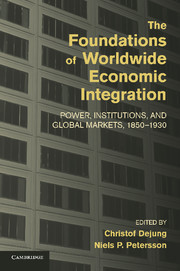The Foundations of Worldwide Economic Integration Power, Institutions, and Global Markets, 1850–1930 Cambridge Studies in the Emergence of Global Enterprise Series
Langue : Anglais
Coordonnateurs : Dejung Christof, Petersson Niels P.

Discusses worldwide economic integration between 1850 and 1930, challenging the popular description of the period after 1918 as one of deglobalisation.
The essays in this volume discuss worldwide economic integration between 1850 and 1930, challenging the popular description of the period after 1918 as one of mere deglobalisation. The authors argue that markets were not only places of material exchange, but also socially structured entities, shaped by the agency of individual actors and by complex structures of political and economic power. Economic transactions were supported by an array of different institutions, ranging from formalised regulations to informal relations of personal trust. They argue that these networks were strong enough to prosper even during and after World War I, in a political climate often hostile to foreign trade. The Foundations of Worldwide Economic Integration shows that institutionalism altered its shape in the face of circumstances that increasingly challenged international trade. By presenting case studies from various countries, this book offers a fresh perspective on crucial periods of economic globalisation.
Preface Harold James; Introduction: power, institutions, and global markets - actors, mechanisms, and foundations of worldwide economic integration, 1850–1930 Christof Dejung and Niels P. Petersson; Part I. Legal Institutions and Private Actors: 1. Legal institutions and the world economy, 1900–30; 2. Against globalisation: sovereignty, courts, and the failure to coordinate international bankruptcies (1870–1940) Jérôme Sgard; 3. Credit information, institutions, and international trade: the UK, US, and Germany, 1850–1930 Rowena Olegario; Part II. Colonial Markets and Non-Western Actors: 4. The London Stock Exchange and the colonial market: a study of internationalisation and power Bernard Attard; 5. The London gold market, 1900–31 Bernd-Stefan Grewe; 6. The boundaries of Western power: the colonial cotton economy in India and the problem of quality Christof Dejung; 7. The colonised as global traders: Indian trading networks in the world economy, 1850–1939 Claude Markovits; 8. The international patent system and the global flow of technologies: the case of Japan, 1880–1930 Pierre-Yves Donzé; Part III. World War I and the Consequences for Economic Globalisation: 9. Transnational cooperation in wartime: the international protection of intellectual property rights during the First World War Isabella Löhr; 10. The resilience of globalisation during the First World War: the case of Bunge and Born in Argentina Philip Dehne; 11. Global economic governance and the private sector: the League of Nations' experiment in the 1920s Michele d'Alessandro.
Christof Dejung is Senior Lecturer and Researcher in the Department of History and Sociology at the University of Konstanz, Germany.
Niels P. Petersson is Senior Lecturer in History at Sheffield Hallam University.
Niels P. Petersson is Senior Lecturer in History at Sheffield Hallam University.
Date de parution : 08-2014
Ouvrage de 296 p.
15.2x22.9 cm
Disponible chez l'éditeur (délai d'approvisionnement : 14 jours).
Prix indicatif 36,76 €
Ajouter au panierDate de parution : 01-2013
Ouvrage de 292 p.
15.8x23.5 cm
Thème de The Foundations of Worldwide Economic Integration :
© 2024 LAVOISIER S.A.S.



